|
|
|
Sort Order |
|
|
|
Items / Page
|
|
|
|
|
|
|
| Srl | Item |
| 1 |
ID:
123059
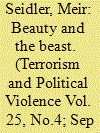

|
|
|
|
|
| Publication |
2013.
|
| Summary/Abstract |
The article deals with the intellectual and philosophical background of Sartre's thought, which made him susceptible to the influence of left-wing totalitarian structures in general and to left-wing terrorism in particular. Consequently it is argued that Sartre's identification with Stalinism in his younger years, and his later sympathies with the infamous German Baader-Meinhof terrorist gang, were more than mere expressions of his personality, but rather part and parcel of his special blend of existentialism and philosophy. At the end of the article, Sartre's position in this matter is contrasted with the position of another existentialist French thinker, Sartre's contemporary, Albert Camus.
|
|
|
|
|
|
|
|
|
|
|
|
|
|
|
|
| 2 |
ID:
124920
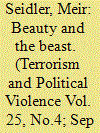

|
|
|
|
|
| Publication |
2013.
|
| Summary/Abstract |
The article deals with the intellectual and philosophical background of Sartre's thought, which made him susceptible to the influence of left-wing totalitarian structures in general and to left-wing terrorism in particular. Consequently it is argued that Sartre's identification with Stalinism in his younger years, and his later sympathies with the infamous German Baader-Meinhof terrorist gang, were more than mere expressions of his personality, but rather part and parcel of his special blend of existentialism and philosophy. At the end of the article, Sartre's position in this matter is contrasted with the position of another existentialist French thinker, Sartre's contemporary, Albert Camus.
|
|
|
|
|
|
|
|
|
|
|
|
|
|
|
|
| 3 |
ID:
172226
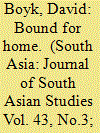

|
|
|
|
|
| Summary/Abstract |
At the turn of the twentieth century, a group of young men in Desna, a qasba (small town) in Bihar, founded an organisation called the Anjuman Al-Islah. There they shared their books in the name of promoting education and cultivation, which they saw as ‘paramount in life’s every undertaking’ and essential to the defence of qasbati culture. Through sustained collaborative efforts, the Anjuman soon built up an impressive library of Urdu books and periodicals. Where other libraries were assembled at the initiative of aristocratic patrons or government officials, the Al-Islah library relied on the contributions of numerous Desnavis, both those who still lived in the qasba and those whose careers had taken them far away. In turn, the Anjuman and its library nurtured Desnavis’ ties to each other and to their watan, or homeland.
|
|
|
|
|
|
|
|
|
|
|
|
|
|
|
|
| 4 |
ID:
078198
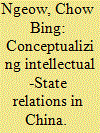

|
|
|
| 5 |
ID:
050239
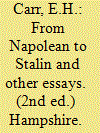

|
|
|
|
|
| Edition |
2nd ed.
|
| Publication |
Hampshire, Palgrave Macmillan, 2003.
|
| Description |
xxi, 277p.Pbk
|
| Standard Number |
0333994019
|
|
|
|
|
|
|
|
|
|
|
|
Copies: C:1/I:0,R:0,Q:0
Circulation
| Accession# | Call# | Current Location | Status | Policy | Location |
| 047558 | 940/CAR 047558 | Main | On Shelf | General | |
|
|
|
|
| 6 |
ID:
116494
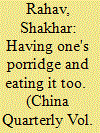

|
|
|
|
|
| Publication |
2012.
|
| Summary/Abstract |
This article examines the "porridge incident," in which the renowned Chinese author, critic and former minister of culture Wang Meng sued a Communist Party literary journal for attacking him and his story "Hard Porridge" ("Jianying de xizhou"). The incident straddled the transitional period between 1989 and 1992 and illuminates the ramifications of structural changes in China's literary sphere. I frame the affair within two contexts: Wang Meng's tortuous career, which challenges dichotomies of bureaucrat vs. dissident, and the transition from a centralized literary sphere to a market-driven one. I argue that Wang's responses to the attack on him stemmed from a political and cultural standing that was the product of a Party-controlled cultural sphere, along with the opportunities offered by expanding reforms. The Deng-era reforms produced a divide between culture, markets and bureaucracy that would preclude cultural figures like Wang from holding such high bureaucratic positions anymore.
|
|
|
|
|
|
|
|
|
|
|
|
|
|
|
|
| 7 |
ID:
073387
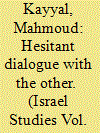

|
|
|
|
|
| Publication |
2006.
|
| Summary/Abstract |
The Arab-Israeli conflict has provided fertile ground for stereotypes, prejudices, and antagonistic dialogue between the two sides. This hostile atmosphere led to a lack of public and academic interest in Israeli culture on the part of Arab intellectuals until the late 1960s. The military defeat in the 1967 war persuaded various elements in the Arab world, particularly Egyptian and Palestinian, to invest a good deal of effort into gaining knowledge of the Israeli 'Other'. Research and translation activity on the subject of Israeli culture has broadened and improved over the years, but it is trapped between two conflicting attitudes to this culture. Scholars and translators close to nationalistic, leftist, and fundamentalist circles adopted an extreme antagonistic attitude, which emphasized the view of 'the Other' as alien and threatening; this standpoint encouraged tendentious methods of research and translation which supported and strengthened it. As against this, other scholars and translators adopted a liberal and pragmatic attitude, which did not negate fruitful dialogue with 'the Other'. This attitude encouraged more objective research and translation, which placed emphasis on the aesthetic and literary value of the translated texts.
|
|
|
|
|
|
|
|
|
|
|
|
|
|
|
|
| 8 |
ID:
183376


|
|
|
|
|
| Summary/Abstract |
Ali Salem was an independent intellectual, unbound to the regime or political parties. He believed that the intellectual must also be independent from the public. It does not mean he must be detached from society or elevated above it, but that he must avoid flattering it. Over thirty years of literary activity, Salem published 27 plays and hundreds of humoresques and short stories, which were collected in 15 books. He also published opinion pieces in the Egyptian press and periodicals. Salem was an uncompromising social and political whip, who criticized Egypt’s society and regime in the context of a political culture that limits freedom of expression and impedes the expression of views that contradict those of the autocratic ruler. The Article will focus on the witty humor Salem used in both his satires and plays to sharply criticize the socio-political maladies from which Egyptian society suffers and at the same time it served as a means to introduce to Egyptians the problems of their society in a way that would make it easier for them to internalize them, shake them out of their apathy and urge them to act in order to improve their lives for the better.
|
|
|
|
|
|
|
|
|
|
|
|
|
|
|
|
| 9 |
ID:
152138
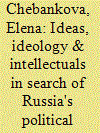

|
|
|
|
|
| Summary/Abstract |
The intellectual discourse of any state can function within two broad paradigms: consensual and pluralistic. In the first case, political elites, intellectuals, and the public agree on the base parameters of what constitutes “the good life” and argue about the methods of application. In the second case, participants hold radically different, incommensurable views, which coexist in society. This essay argues that the Western political system broadly rests on the politics of liberal consensus, formed throughout the period of capitalist modernization. But Russia's history took a different turn, following a path of alternative modernization. This engendered the politics of paradigmatic pluralism, in which a number of radically different politico-intellectual frameworks struggle for the dominant discourse. This essay examines these paradigms and argues that, due to the nature and substance of these models, fundamental change of Russia's dominant discourse, along with its main politico-institutional parameters, is unlikely.
|
|
|
|
|
|
|
|
|
|
|
|
|
|
|
|
| 10 |
ID:
104108
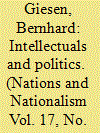

|
|
|
|
|
| Publication |
2011.
|
| Summary/Abstract |
By imagining their audiences, intellectuals invented and constructed the collective identities of nations and transnational communities like Europe or humankind. Four ideal types of intellectuals are outlined by describing them in their relation to politics: the intellectual as cosmopolitan ascetic; the intellectual as enlightened legislator; the intellectual as revolutionary; and the intellectual as the voice of a traumatic memory. These ideal types change over time in response to their focus of attention and their mode of communication. Because of changes in their media (from handwritten to printed books) and changes in their written language (from Latin to French and Italian, and further to vernacular languages), intellectuals were able to change views on past, present and future times. Today, they are involved in (civic) resistance but rarely in politics per se. By renewing the tension of the sacred and profane - the so-called axial-age revolution - contemporary intellectuals in Eastern Europe are decoupled from direct political power.
|
|
|
|
|
|
|
|
|
|
|
|
|
|
|
|
| 11 |
ID:
172111
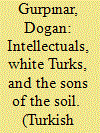

|
|
|
|
|
| Summary/Abstract |
The article is made up of two distinct parts. The first part surveys the discourses and tropes of intellectuality of the Turkish old-right. The second part specifically discusses the crisis of the conservative intelligentsia as the Islamist takeover of Turkish government in 2002 did not result in conservative intellectuals dominating the intellectual realm. Continuing to remain marginalized and their promises unfulfilled, they have refurbished the old right’s tropes of intellectualism and reiterate the tropes of usurpation of the intellectual realm, while claiming to represent the genuine intelligentsia of the organic nation.
|
|
|
|
|
|
|
|
|
|
|
|
|
|
|
|
| 12 |
ID:
163292
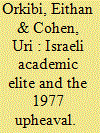

|
|
|
|
|
| Summary/Abstract |
This article analyses the reactions of Israel’s academic elite to the 1977 political upheaval. Some of Israel’s leading scholars in humanities and social sciences framed the new political situation as a grave ideological and moral crisis, reflecting the triumph of fundamentalist, nationalist, emotional and messianic trends over the rational, moderate, responsible political tradition that they had favoured and claimed to represent. The political change triggered a heated debate about the role of intellectuals in the ideological rehabilitation of the Labour party, as well as on the critical function of universities in the political arena. In the wake of what it perceived as a sharp deviation from the proper development of the traditional Zionist programme, the academic elite came to be perceived, in its own eyes as well as those of the public, as a faithful representative of the ‘old regime’, as an opponent to the new governmental elite and, for the first time, as an ideological opposition to Israel’s political hegemony.
|
|
|
|
|
|
|
|
|
|
|
|
|
|
|
|
| 13 |
ID:
121255
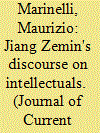

|
|
|
|
|
| Publication |
2013.
|
| Summary/Abstract |
This article focuses on the specific forms of power that are
embodied in the properties and functions of formalised language, as it
was used by Jiang Zemin in crucial political documents on the Party's
policy towards intellectuals. This inquiry illuminates various possibilities
for the normalisation and inculcation of formalised language in the understudied decade of the 1990s, when the mantra "without stability,
nothing can be achieved" became a tautology. The internal constitution
of the selected texts is examined with an eye to the dialogic interaction
with the production and reception of Mao Zedong and Deng Xiaoping's
political discourses on intellectuals (Mao 1942; Deng 1978). The analysis
of language practices and discursive formations in a comparative perspective sheds light on the respective socio�political and historical contexts. It also reveals the extreme involution�devolution of formalised
language in the Jiang Zemin era, when "preserving stability" was reaffirmed as a crucial concern of the Party leadership with the ultimate aim
of preserving its monopoly of power.
|
|
|
|
|
|
|
|
|
|
|
|
|
|
|
|
| 14 |
ID:
158371
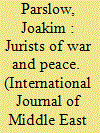

|
|
|
|
|
| Summary/Abstract |
The jurists who entered Turkish academia during the 1930s built the foundations of their discipline under a regime that became increasingly authoritarian as war drew closer. Like their peers in Italy and France, therefore, they had to produce coherent doctrines but also support the frequent use of exceptional emergency powers. How did they solve this contradiction? More importantly, what consequences did their solutions have for the use of emergency powers after the war? This article adopts a Deleuzian reading of two strategies with which Turkish jurists met that challenge, approaching their work not simply as theories about law but also as models for the role law should play in the articulation of public authority. Focusing on Ali Fuad Başgil and Sıddık Sami Onar, law professors at Istanbul University, I argue that although both professors supported the regime, only a situational doctrine of the kind Onar produced was capable of ensuring that jurists would have a place in the exercise of “exceptional” state powers after the 1950 transition to democracy.
|
|
|
|
|
|
|
|
|
|
|
|
|
|
|
|
| 15 |
ID:
181926
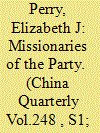

|
|
|
|
|
| Summary/Abstract |
Among the most distinctive features of Chinese Communist Party governance is the frequent deployment of work teams to conduct campaigns, implement policies and troubleshoot crises. An underappreciated aspect of work-team operations from Land Reform to the present has been the active participation of educated intellectuals as key intermediaries between central leaders and grassroots society. Serving in effect as “missionaries” of the Party, intellectual work-team members function as trained “ritual specialists” in carrying out their appointed mission. Although work teams are often not the most efficient or effective means of governance, the impact of work-team experience on team members themselves is consequential. Employing quasi-religious practices designed to promote the ideological incorporation of intellectuals, work teams have helped to forestall the emergence in China of an alienated class of dissidents like those whose criticisms eroded the legitimacy of Communist regimes elsewhere in the world.
|
|
|
|
|
|
|
|
|
|
|
|
|
|
|
|
| 16 |
ID:
161355
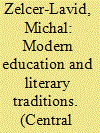

|
|
|
|
|
| Summary/Abstract |
In 1949, illiteracy among both Uyghurs and Tibetans was similar to that throughout China and estimated as higher than 90%. Since then, the rate of illiteracy in Xinjiang has shrunk considerably, while in Tibet it has remained the highest in China. This gap can explain the difference between the small volume of literature published annually in Tibet and the extensive literature that appears yearly in Xinjiang. A major reason for the high literacy rate and the emergence of a thriving modern literature in Xinjiang is the system of modern education that developed in the region at the start of the twentieth century. In contrast, in Tibet, the religious conservatism of the Buddhist elite prevented the introduction of modern education in order to retain local cultures. The comparison of the influences of modern education on the creation of literary traditions allows us to examine the continuity of Uyghur and Tibetan cultures in the context of contemporary China.
|
|
|
|
|
|
|
|
|
|
|
|
|
|
|
|
| 17 |
ID:
078196
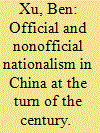

|
|
|
| 18 |
ID:
180011
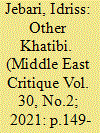

|
|
|
|
|
| Summary/Abstract |
The recent revival of interest in Moroccan thinker Abdelkebir Khatibi (1938–2009) around the English release of his seminal 1983 essay, Maghreb Pluriel represents an opportunity to place this thinker in the inner circle of post-1967 Arab thought. This article argues that most coverage and commemoration of him has been devoted to a glorified side of his trajectory that fits neatly within the framework of ‘postcolonial francophone intellectuals.’ However, this article argues that we must revise the meaning of his seminal book and his call for a ‘plural Maghreb’ to see it also as the demise of his project for a decolonized sociology in Morocco, which was necessary to set his sights toward semiology and his significant literary oeuvre. His example informs us on Arab intellectual strategies after the end of grand ideological narratives, and how to write Arab intellectual and cultural histories without succumbing to the trap of nostalgia.
|
|
|
|
|
|
|
|
|
|
|
|
|
|
|
|
| 19 |
ID:
123054
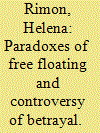

|
|
|
|
|
| Publication |
2013.
|
| Summary/Abstract |
Throughout the 1900s, intellectuals have been defined as a "privileged minority" (according to Chomsky), or as outsiders, whose "free floating" condition (Mannheim) guarantees their functioning as "custodians of values like reason and justice" (Hofstadter). Julien Benda accused intellectuals of betraying this mission. But, perhaps, betrayal is built into the very nature of their privileged position; perhaps, by pretending to be "free floating," generations of intellectuals have actually been constructing predictable paradigms, using calamity as a new kind of raw material for the old myth of lucrimax (Etkind). The tragic experience of Russian intellectuals provides us with fresh insight for this discussion.
|
|
|
|
|
|
|
|
|
|
|
|
|
|
|
|
| 20 |
ID:
124914
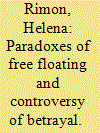

|
|
|
|
|
| Publication |
2013.
|
| Summary/Abstract |
Throughout the 1900s, intellectuals have been defined as a "privileged minority" (according to Chomsky), or as outsiders, whose "free floating" condition (Mannheim) guarantees their functioning as "custodians of values like reason and justice" (Hofstadter). Julien Benda accused intellectuals of betraying this mission. But, perhaps, betrayal is built into the very nature of their privileged position; perhaps, by pretending to be "free floating," generations of intellectuals have actually been constructing predictable paradigms, using calamity as a new kind of raw material for the old myth of lucrimax (Etkind). The tragic experience of Russian intellectuals provides us with fresh insight for this discussion.
|
|
|
|
|
|
|
|
|
|
|
|
|
|
|
|
|
|
|
|
|